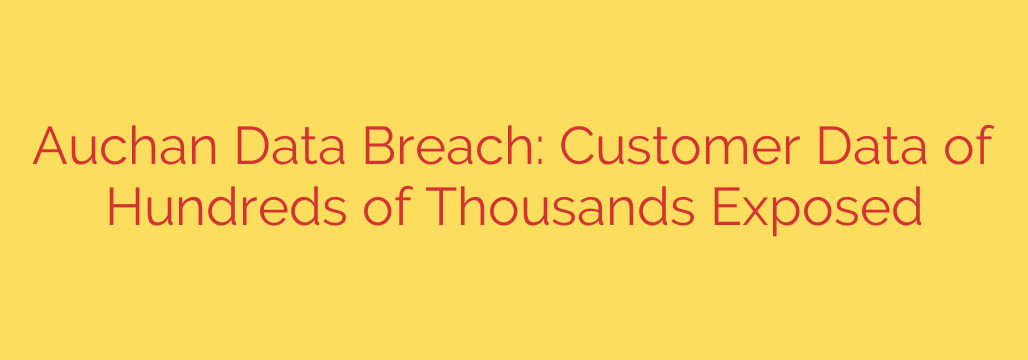
Auchan Data Breach Exposes Customer Information: What You Need to Know and How to Protect Yourself
A significant data breach at the international retail giant Auchan has exposed the personal information of hundreds of thousands of customers. The security incident, which reportedly originated with a third-party service provider, has compromised a sensitive cache of user data, putting affected individuals at risk of phishing scams, identity theft, and other malicious activities.
If you are an Auchan customer, it is crucial to understand the scope of this breach and take immediate steps to secure your personal information.
What Happened in the Auchan Data Breach?
The breach was not a direct attack on Auchan’s primary servers but stemmed from a vulnerability associated with one of its partners. This is a common pattern in modern cyberattacks, where attackers target the weakest link in a company’s digital supply chain.
Once the vulnerability was exploited, unauthorized actors gained access to a database containing a substantial volume of customer data. The company has since acknowledged the incident and has begun notifying those who were affected.
What Customer Data Was Exposed?
While investigations are ongoing, the compromised data is understood to include highly sensitive personal details. Crucially, initial reports indicate that payment card information and account passwords were not exposed. However, the leaked information is still valuable to cybercriminals.
The exposed data includes:
- Full Names
- Email Addresses
- Phone Numbers
- Tax Identification Numbers (such as the NIF in Portugal)
- Loyalty Card Numbers
This combination of data is particularly dangerous, as it provides criminals with enough information to craft highly convincing and targeted scams.
The Immediate Risks to Affected Customers
With this data in hand, attackers can launch sophisticated campaigns that appear legitimate. The primary threats you should be aware of are:
- Targeted Phishing Attacks: Criminals can use your name, email, and knowledge of your connection to Auchan to create fake emails or text messages (smishing). These messages might ask you to click a link to “verify your account” or “claim a prize,” leading to a malicious website designed to steal your passwords or financial details.
- Identity Theft: The exposure of tax identification numbers is a serious concern. This information can be used to open fraudulent accounts, file false tax returns, or commit other forms of identity fraud.
- Spam and Robocalls: Your exposed phone number and email address will likely be added to lists used for large-scale spam and unwanted marketing calls.
How to Protect Yourself After the Auchan Data Leak
Even if you haven’t received a notification, it’s wise to act proactively. Follow these essential security steps immediately to mitigate your risk.
Be Extremely Vigilant with Communications: Treat any unsolicited email, text, or phone call claiming to be from Auchan with suspicion. Do not click on links or download attachments from these messages. If you need to check your account, navigate directly to the official Auchan website by typing the address into your browser.
Secure Your Auchan Account Password: Although passwords were reportedly not leaked, it is a best practice to change your password for your Auchan online account. Use a long, unique, and complex password that you do not use for any other service.
Enable Two-Factor Authentication (2FA): Wherever possible, enable 2FA on your important online accounts (email, banking, social media). This provides a critical layer of security by requiring a second verification step, such as a code sent to your phone, in addition to your password.
Monitor Your Financial Accounts: Keep a close eye on your bank and credit card statements for any unusual or unauthorized activity. Report any suspicious transactions to your financial institution immediately.
Never Share Sensitive Information: Remember that Auchan, your bank, or any other legitimate organization will never ask you for your full password, PIN, or complete credit card number via email or text message. Any request for this information is a major red flag for a scam.
Staying informed and taking these preventative measures is the best defense against those looking to exploit this unfortunate security incident. By remaining cautious and securing your digital footprint, you can significantly reduce your risk of becoming a victim of fraud.
Source: https://securityaffairs.com/181556/data-breach/auchan-discloses-data-breach-data-of-hundreds-of-thousands-of-customers-exposed.html








